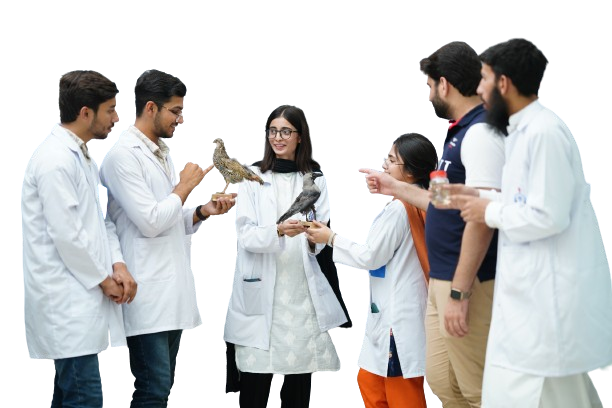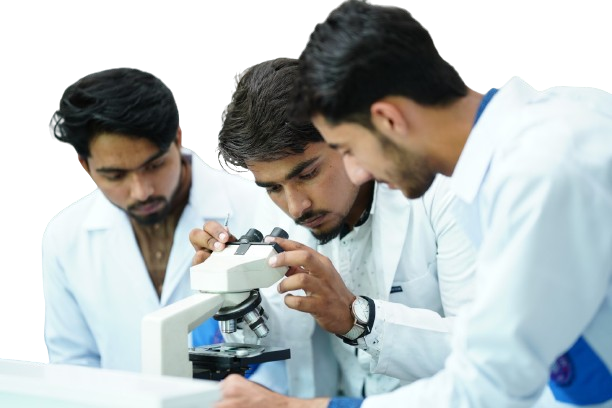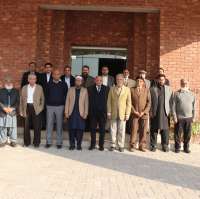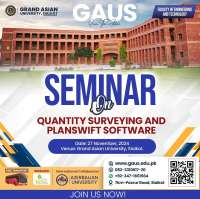Begin Your Journey in BSc Electrical Engineering!
Unlock a future in a versatile, high-tech field with expertise in AI, Robotics, Cybersecurity, Coding, Computer Architecture, Data Communication, and Networking—all integrated within one comprehensive degree program.
Join Our Esteemed Faculty:
Prof. Dr. Sharif Bhatti – Former Vice-Chancellor, UET Taxila
Prof. Dr. A H Bangash – Specialist in Communication, Networks & IoT
Dr. M.I. Afridi – Expert in Communication & Network Security
Dr. A. Samad – Robotics & Sensor Technologies
Dr. Mansoor – Artificial Intelligence & Electronics
Prof. Dr. Yasin Cohan – Mechatronics
Why Choose Us?
Inclusive Programs: Special scholarships for female students
Open Enrollment: Pre-Medical students are welcome, with preparatory math classes available
Convenience: Free transport services for students
Supportive Environment: Access to discounted health services for students and families at affiliated hospitals
Career Advantage: Industry exposure and an OBE-based curriculum, accredited under the Washington Accord, for enhanced global job opportunities, including pathways to the USA and Europe.
Electrical engineers design the most sophisticated systems ever built. From computers with billions of transistors to microgrids fed by renewable energy sources, from algorithms that predict disease to solar cells and electric vehicles, electrical engineering touches all parts of modern society. We leverage computational, theoretical, and experimental tools to develop ground-breaking sensors and energy transducers, new physical substrates for computation, and the systems that address the shared challenges facing humanity.
Our research is interdisciplinary by nature and has far-reaching effects on almost every field of human activity, including energy and climate, human health, communications and computation, finance, and music. We make the future.
Placement of Electrical Engineers
Electrical Engineers can be placed/utilized in following disciplines
Artificial Intelligence and Machine Learning
Electrical Engineering covers a wide range of topics of this fast-evolving field, advancing how machines learn, predict, and control, while also making them secure, robust, and trustworthy. Research covers both the theory and applications of ML. This broad area studies ML theory (algorithms, optimization, …), statistical learning (inference, graphical models, causal analysis, …), deep learning, reinforcement learning, symbolic reasoning ML systems, as well as diverse hardware implementations of ML.
Biological and Medical Devices and Systems
Electrical Engineers develop the technology and systems that will transform the future of biology and healthcare. Specific areas include biomedical sensors and electronics, nano- and micro-technologies, imaging, and computational modelling of disease.
Communications Systems
Electrical Engineering the next generation of wired and wireless communications systems, from new physical principles (e.g., light, terahertz waves) to coding and information theory, and everything in between.
Computer Architecture
Electrical Engineering the next generation of computer systems. Working at the intersection of hardware and software, our research studies how to best implement computation in the physical world. We design processors that are faster, more efficient, easier to program, and secure. Our research covers systems of all scales, from tiny Internet-of-Things devices with ultra-low-power consumption to high-performance servers and datacentres that power planet-scale online services. We design both general-purpose processors and accelerators that are specialized to application domains, like machine learning and storage. We also design Electronic Design Automation (EDA) tools to facilitate the development of such systems.
Computational Fabrication and Manufacturing
Electrical Engineering bring some of the most powerful tools in computation to bear on design problems, including modelling, simulation, processing and fabrication.
Educational Technology
Educational technology combines both hardware and software to enact global change, making education accessible in unprecedented ways to new audiences. We develop the technology that makes better understanding possible.
Electronic, Magnetic, Optical and Quantum Materials and Devices
Our research spans a wide range of materials that form the next generation of devices, and includes ground-breaking research on graphene & 2D materials, quantum computing, MEMS & NEMS, and new substrates for computation.
Energy
Our research focuses on solving challenges related to the transduction, transmission, and control of energy and energy systems. We develop new materials for energy storage, devices and power electronics for harvesting, generation and processing of energy, and control of large-scale energy systems.
Integrated Circuits and Systems
Our field deals with the design and creation of sophisticated circuits and systems for applications ranging from computation to sensing.
Nanoscale Materials, Devices, and Systems
Our research focuses on the creation of materials and devices at the nano scale to create novel systems across a wide variety of application areas.
Robotics
Our research focuses on robotic hardware and algorithms, from sensing to control to perception to manipulation.
Signal Processing
Signal processing focuses on algorithms and hardware for analyzing, modifying and synthesizing signals and data, across a wide variety of application domains. As a technology it plays a key role in virtually every aspect of modern life including for example entertainment, communications, travel, health, defense and finance.
Systems and Networking
From distributed systems and databases to wireless, the research conducted by the systems and networking group aims to improve the performance, robustness, and ease of management of networks and computing systems.
Systems Theory, Control, and Autonomy
Our theoretical research includes quantification of fundamental capabilities and limitations of feedback systems, inference and control over networks, and development of practical methods and algorithms for decision making under uncertainty.










